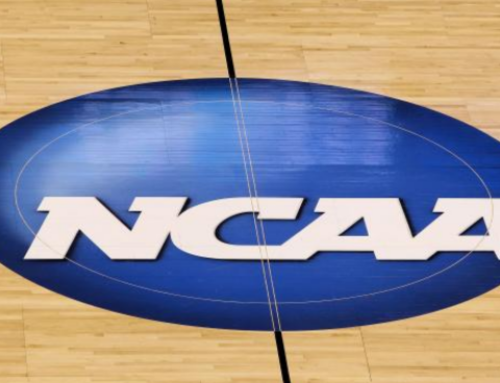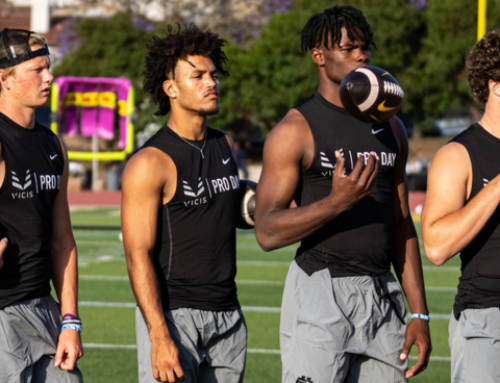Is JUCO Football Right For Me?
What is JUCO Football?
JUCO Football is a shorthand way of referring to football played at the junior college level. Junior colleges, frequently also referred to as community colleges, are two-year institutions where a student-athlete can earn an Associate’s Degree before transferring to a four-year university. Most junior college athletic associations require student-athletes to have a high school diploma or GED before they can participate in sports.
What Sort of Student-Athletes Play JUCO Football?
Many student-athletes attend a junior colleges straight out of high school with the goal of going on to play at a four-year university. Junior college can be a place for them to mature physically, mentally and emotionally, ultimately making them more attractive recruits. Some players transfer to a junior college from a four-year university, either because of disciplinary issues or because they believe it can help them ultimately wind up in a better situation at a different four-year university. Certain junior colleges offer athletes full scholarships, others offer partial scholarships and some offer no financial aid.

Are JUCO Football Teams Part of the NCAA?
No. Many junior college football teams compete in the National Junior College Athletic Association, or NJCAA. A large number of teams also play in the California Community College Athletic Association (CCCAA). The NJCAA and the CCCAA represent the two major governing bodies of junior college football.
How Many JUCO Football Teams Are There?
Between the NJCAA and the CCCAA, there are 187 active junior college football teams, many of them concentrated in a handful of states. California has 69 junior college football teams, by far the most of any state. All 69 of them participate in the CCCAA. Arizona, Kansas, Minnesota, Mississippi, New York and Texas are other junior college football hotbeds, with each state containing at least six schools that field teams.

Did Any Famous NFL Players Play JUCO Football?
A number of players who attended junior college have gone on to become impact players in the NFL. They include Cam Newton (Blinn College), Aaron Rodgers (Butte Community College), Keyshawn Johnson (West Los Angeles College), Roger Staubach (New Mexico Military Institute) and Corey Dillon (Garden City Community College).
What Are the Traditional JUCO Powerhouse Programs?
In recent years, East Mississippi Community College (Scooba, Mississippi) has emerged as the team to beat. They’ve won three NJCAA National Championships since 2011. Butler Community College (El Dorado, Kansas) won five NJCAA National Championships between 1998 and 2008. Blinn College (Brenham, Texas) also has a strong program. They’ve captured four NJCAA National Championships since 1995. In the CCCAA, the City College of San Francisco has won six titles since 1999. Mt. San Antonio College (Walnut, California) and Butte College (Oroville, California) are also perennial CCCAA contenders.

Cam Newton at Blinn College. Photo via BuccaneerSports.com
How Do Four-Year Universities Recruit Players From JUCOs?
Many four-year universities have relationships with junior college programs and scout their teams closely. If they believe a player can help their team, they can offer him a scholarship, just as they would for a high school player. Recruiting services offer separate rankings for junior college players, assigning them star rankings like they do for high school players. Many junior college programs pride themselves on the number of players they send to Division I programs, so they’re typically very helpful in getting players exposure.
What Are The Rules on Transferring From a JUCO to a Four-Year University?
Junior college student-athletes must meet certain academic requirements before they can transfer to play at a four-year university. The rules can be a bit complex, depending on the situation, but they largely center around maintaining a solid GPA and taking a certain number of credit hours. Just like high school recruits, if a junior college recruit isn’t able to meet the academic requirements, he cannot accept a scholarship offer from a four-year university.
You can read more about the academic requirements involved in transferring to and from a junior college here.

Aaron Rodgers at Butte Community College. Photo via @DarrenRovell
If a Player Transfers from a JUCO to a Four-Year University, How Many Seasons of Eligibility Does He Have Remaining?
Time spent at a junior college counts against a student-athlete’s four seasons of NCAA competition. Let’s say you go to a junior college straight out of high school and play two seasons of football there. If you then transfer to a four-year university, you’ll only have two remaining seasons of eligibility. Or, if you play one season at a four-year university and then transfer to a junior college to play for two seasons, you’ll only have one remaining season of eligibility if you transfer back to a four-year university.
I’m Interested in Playing Junior College Football. What Should I Do?
Most junior colleges have slim recruiting budgets. While they might go after extremely talented kids who don’t yet have the grades to play at a four-year university, they cannot cast an especially wide net. Therefore, if you’re interested in playing junior college football, you should be proactive in your approach. Contact coaches at the schools you’re interested in and start a conversation. Though junior college football doesn’t have the glitz and glamour of Division I programs, it can be an excellent stepping stone to a four-year university.
RELATED POSTS
RECOMMENDED FOR YOU
MOST POPULAR
Is JUCO Football Right For Me?
What is JUCO Football?
JUCO Football is a shorthand way of referring to football played at the junior college level. Junior colleges, frequently also referred to as community colleges, are two-year institutions where a student-athlete can earn an Associate’s Degree before transferring to a four-year university. Most junior college athletic associations require student-athletes to have a high school diploma or GED before they can participate in sports.
What Sort of Student-Athletes Play JUCO Football?
Many student-athletes attend a junior colleges straight out of high school with the goal of going on to play at a four-year university. Junior college can be a place for them to mature physically, mentally and emotionally, ultimately making them more attractive recruits. Some players transfer to a junior college from a four-year university, either because of disciplinary issues or because they believe it can help them ultimately wind up in a better situation at a different four-year university. Certain junior colleges offer athletes full scholarships, others offer partial scholarships and some offer no financial aid.

Are JUCO Football Teams Part of the NCAA?
No. Many junior college football teams compete in the National Junior College Athletic Association, or NJCAA. A large number of teams also play in the California Community College Athletic Association (CCCAA). The NJCAA and the CCCAA represent the two major governing bodies of junior college football.
How Many JUCO Football Teams Are There?
Between the NJCAA and the CCCAA, there are 187 active junior college football teams, many of them concentrated in a handful of states. California has 69 junior college football teams, by far the most of any state. All 69 of them participate in the CCCAA. Arizona, Kansas, Minnesota, Mississippi, New York and Texas are other junior college football hotbeds, with each state containing at least six schools that field teams.

Did Any Famous NFL Players Play JUCO Football?
A number of players who attended junior college have gone on to become impact players in the NFL. They include Cam Newton (Blinn College), Aaron Rodgers (Butte Community College), Keyshawn Johnson (West Los Angeles College), Roger Staubach (New Mexico Military Institute) and Corey Dillon (Garden City Community College).
What Are the Traditional JUCO Powerhouse Programs?
In recent years, East Mississippi Community College (Scooba, Mississippi) has emerged as the team to beat. They’ve won three NJCAA National Championships since 2011. Butler Community College (El Dorado, Kansas) won five NJCAA National Championships between 1998 and 2008. Blinn College (Brenham, Texas) also has a strong program. They’ve captured four NJCAA National Championships since 1995. In the CCCAA, the City College of San Francisco has won six titles since 1999. Mt. San Antonio College (Walnut, California) and Butte College (Oroville, California) are also perennial CCCAA contenders.

Cam Newton at Blinn College. Photo via BuccaneerSports.com
How Do Four-Year Universities Recruit Players From JUCOs?
Many four-year universities have relationships with junior college programs and scout their teams closely. If they believe a player can help their team, they can offer him a scholarship, just as they would for a high school player. Recruiting services offer separate rankings for junior college players, assigning them star rankings like they do for high school players. Many junior college programs pride themselves on the number of players they send to Division I programs, so they’re typically very helpful in getting players exposure.
What Are The Rules on Transferring From a JUCO to a Four-Year University?
Junior college student-athletes must meet certain academic requirements before they can transfer to play at a four-year university. The rules can be a bit complex, depending on the situation, but they largely center around maintaining a solid GPA and taking a certain number of credit hours. Just like high school recruits, if a junior college recruit isn’t able to meet the academic requirements, he cannot accept a scholarship offer from a four-year university.
You can read more about the academic requirements involved in transferring to and from a junior college here.

Aaron Rodgers at Butte Community College. Photo via @DarrenRovell
If a Player Transfers from a JUCO to a Four-Year University, How Many Seasons of Eligibility Does He Have Remaining?
Time spent at a junior college counts against a student-athlete’s four seasons of NCAA competition. Let’s say you go to a junior college straight out of high school and play two seasons of football there. If you then transfer to a four-year university, you’ll only have two remaining seasons of eligibility. Or, if you play one season at a four-year university and then transfer to a junior college to play for two seasons, you’ll only have one remaining season of eligibility if you transfer back to a four-year university.
I’m Interested in Playing Junior College Football. What Should I Do?
Most junior colleges have slim recruiting budgets. While they might go after extremely talented kids who don’t yet have the grades to play at a four-year university, they cannot cast an especially wide net. Therefore, if you’re interested in playing junior college football, you should be proactive in your approach. Contact coaches at the schools you’re interested in and start a conversation. Though junior college football doesn’t have the glitz and glamour of Division I programs, it can be an excellent stepping stone to a four-year university.
RELATED POSTS
RECOMMENDED FOR YOU
Create A Free Recruiting Profile Today!
CaptainU helps athletes & parents not only be proactive but also to manage and take control of their entire recruiting journey.










